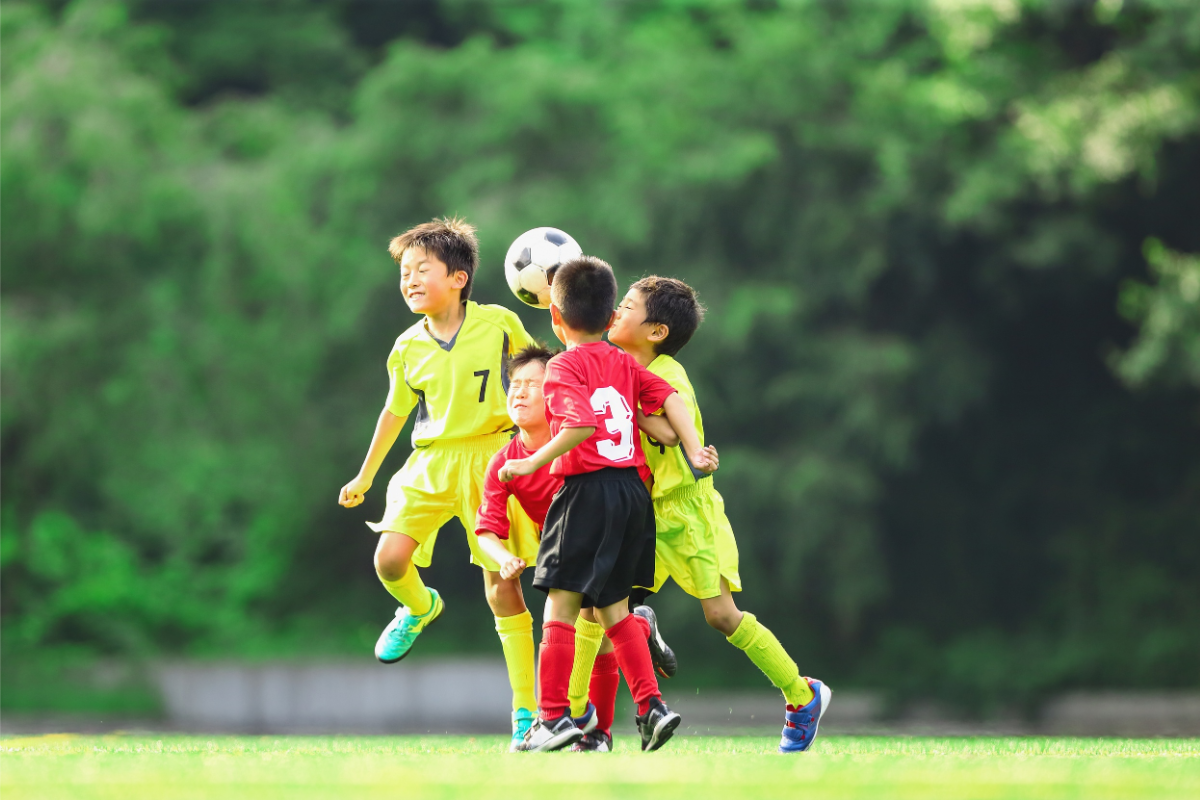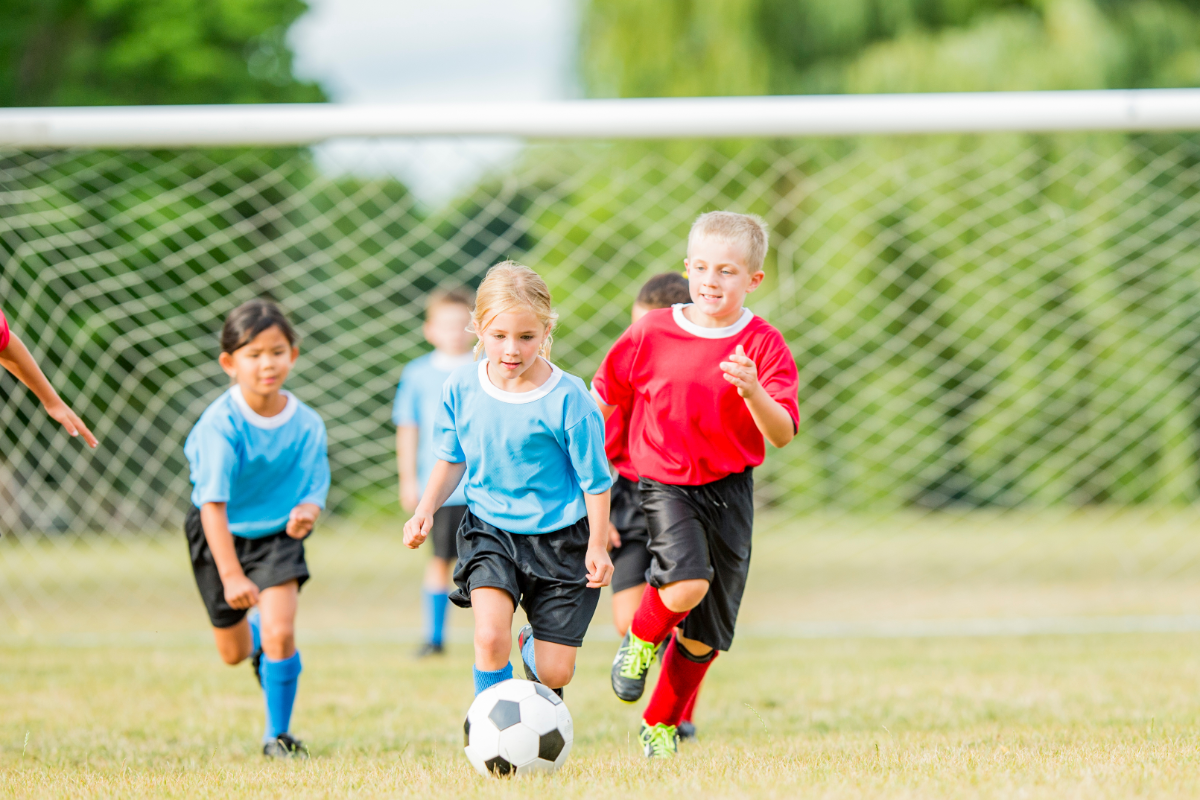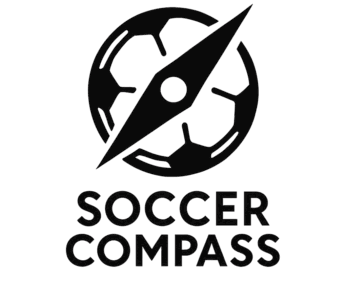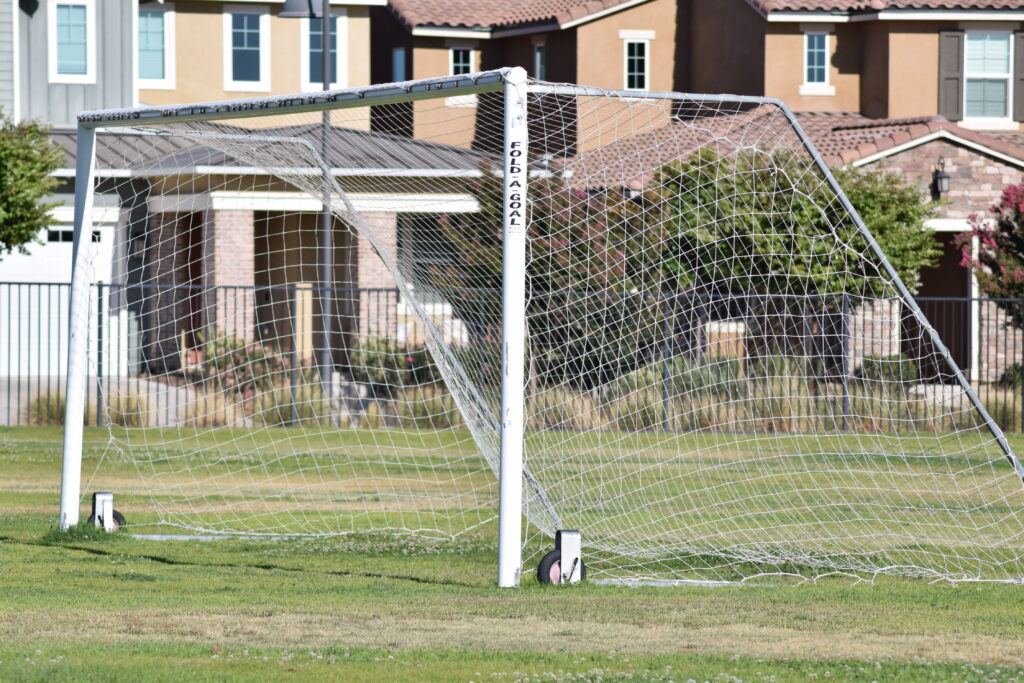The Complete Guide for Parents
Wondering when should kids start soccer? Most children can begin playing soccer as early as age 3-4, but the best age for soccer depends on your child’s individual development, interest, and physical readiness. Here’s everything parents need to know about soccer starting age and youth soccer age requirements divided into four parts.
How Soccer is Structured in the United States
- Understanding Soccer Starting Age: Development vs. Calendar Age
- Kids Soccer Age Groups: Understanding Youth Soccer Structure
When should you start?
Is Your Child Ready?
Are You Ready?
Understanding Soccer Starting Age: Development vs. Calendar Age
Why Age Isn’t Everything in Youth Soccer
When parents ask “what age start soccer,” they’re often thinking about calendar age. However, child development experts emphasize that developmental readiness matters more than chronological age when determining if a child should start playing soccer.
Key Development Factors:
- Physical coordination: Can they run without frequently falling?
- Attention span: Can they focus on simple instructions for 5-10 minutes?
- Social readiness: Are they comfortable playing with other children?
- Following directions: Can they understand and follow basic rules?
- Emotional maturity: Can they handle minor frustrations or disappointments?
The Science Behind Youth Soccer Age Requirements
Research from the American Academy of Pediatrics suggests that most children develop the necessary coordination and cognitive skills for organized sports between ages 4-6. However, every child develops at their own pace.
Physical Development Milestones:
- Ages 3-4: Basic running, jumping, and kicking develop
- Ages 4-5: Balance and coordination improve significantly
- Ages 5-6: Can understand simple game concepts
- Ages 6-8: Develop more complex motor skills and spatial awareness
Cognitive Development Factors:
- Ages 3-4: Beginning to understand turn-taking and sharing
- Ages 4-6: Can follow multi-step instructions
- Ages 6-8: Understand cause and effect, basic strategy
- Ages 8+: Capable of understanding positions and teamwork
Kids Soccer Age Groups: Understanding Youth Soccer Structure
How Youth Soccer Age Groups Work
Understanding kids soccer age groups helps parents choose appropriate programs and set realistic expectations.
Standard Age Group Format:
- U6 (Under 6): Ages 4-5
- U8 (Under 8): Ages 6-7
- U10 (Under 10): Ages 8-9
- U12 (Under 12): Ages 10-11
- U14 (Under 14): Ages 12-13
Important Notes:
- Age cutoff is typically December 31st of the playing year
- “Under” means maximum age allowed in that division
- Some leagues use different age groupings or cutoff dates
Age Group Characteristics and Expectations
U6 Soccer (Ages 4-5)
Game Format: 3v3 or 4v4
Field Size: Very small (30×20 yards typical)
Game Duration: 4 quarters of 6-8 minutes
Focus: Fun, basic ball skills, no pressure
Typical Skills Developed:
- Running with the ball
- Basic kicking
- Taking turns
- Following simple instructions
- Having fun with teammates
U8 Soccer (Ages 6-7)
Game Format: 7v7
Field Size: Small (60×40 yards typical)
Game Duration: 2 halves of 20-25 minutes
Focus: Basic positions, simple rules, skill development
Typical Skills Developed:
- Improved ball control
- Basic passing and receiving
- Understanding positions
- Simple team concepts
- Basic defensive ideas
U10 Soccer (Ages 8-9)
Game Format: 9v9
Field Size: Medium (80×50 yards typical)
Game Duration: 2 halves of 30 minutes
Focus: Tactical awareness, skill refinement
Typical Skills Developed:
- More complex ball skills
- Tactical understanding
- Position-specific skills
- Consistent passing accuracy
- Basic strategy comprehension
U12+ Soccer (Ages 10+)
Game Format: 11v11 (full-sided)
Field Size: Full or near-full size
Game Duration: 2 halves of 30-35 minutes
Focus: Advanced tactics, competitive play

Typical Skills Developed:
- Advanced technical skills
- Complex tactical concepts
- Leadership abilities
- Specialized position play
- Mental toughness
Age-by-Age Guide: When Should Kids Start Soccer?
Ages 3-4: Toddler Soccer Programs

What to Expect:
- Parent-child classes or very small groups
- Focus on basic movements: running, jumping, kicking
- 15-30 minute sessions
- Lots of free play and exploration
- No formal rules or positions
Benefits of Starting at Age 3-4:
- Early exposure to soccer builds familiarity
- Develops gross motor skills
- Introduces social play concepts
- Builds positive associations with physical activity
Is Age 3-4 Right for Your Child?
✅ Yes, if: They enjoy running and physical activity, can follow simple directions, show interest in balls and kicking
❌ Wait, if: They’re not yet walking confidently, have difficulty with separation from parents, show no interest in physical activities
Sample Toddler Soccer Activities:
- Red light/green light with soccer balls
- “Follow the leader” dribbling
- Kicking balls into big goals
- Animal walks and movements
- Simple passing with parents
Ages 4-6: The Sweet Spot for Soccer Starting Age
Most soccer experts consider ages 4-6 the best age for soccer for the majority of children. This is when most youth soccer programs begin accepting players.
Why Ages 4-6 Are Ideal:
- Physical readiness: Basic coordination is established
- Cognitive development: Can understand simple rules and instructions
- Social skills: Ready for group activities and basic teamwork
- Attention span: Can focus for 30-45 minute activities
- Learning capacity: Rapid skill acquisition during this period
Typical 4-6 Year Old Soccer Programs:
- Game format: 3v3 or 4v4 on small fields
- Game duration: 20-30 minutes total
- Focus: Fun, basic skills, equal participation
- Rules: Simplified or no offside, frequent substitutions
- Equipment: Size 3 soccer balls, small goals
Skills Developed at Ages 4-6:
- Basic ball control and dribbling
- Simple passing and receiving
- Running with the ball
- Following basic game rules
- Turn-taking and sharing
- Listening to coaches
Red Flags That Suggest Waiting:
- Frequent meltdowns during activities
- Cannot follow simple two-step directions
- Extreme shyness preventing participation
- Lack of interest in physical activities
- Difficulty with potty training or basic self-care
Ages 6-8: Still Excellent for Soccer Beginners
Children who start soccer at ages 6-8 often progress quickly due to improved coordination and cognitive abilities.
Advantages of Starting at 6-8:
- Faster skill development: Better coordination allows quicker learning
- Improved attention span: Can handle longer practices and games
- Better rule comprehension: Understand more complex game concepts
- Social readiness: More comfortable with group dynamics
What’s Different for 6-8 Year Olds:
- Game format: 7v7 or 9v9 depending on league
- Game duration: 40-60 minutes with breaks
- Skill focus: More structured drills and skill development
- Positions: Introduction to basic positions and roles
- Competition: Gentle introduction to keeping score
Catching Up Strategies for Later Starters:
- Extra practice at home with basic ball skills
- Private lessons to accelerate fundamental development
- Summer camps or clinics for intensive skill building
- Focus on fun to build confidence and interest
Ages 8-10: The Transition Years
Starting soccer at ages 8-10 is still very successful, though children may need additional support to catch up with peers who started earlier.
Considerations for 8-10 Year Old Beginners:
- Skill gap: Other children may have 2-4 years of experience
- Physical development: Better coordination allows rapid improvement
- Mental maturity: Can understand complex instructions quickly
- Social dynamics: May feel self-conscious about skill differences
Success Strategies for Later Starters:
- Choose the right program: Look for beginner-friendly or instructional leagues
- Extra practice: Dedicate time to home practice and skill development
- Positive mindset: Focus on improvement rather than comparison
- Additional training: Consider camps, clinics, or private lessons
- Patience: Allow 1-2 seasons to develop foundational skills
Ages 10+: Never Too Late to Start
While less common, children can successfully start soccer at age 10 and beyond, though they’ll face unique challenges.
Challenges for 10+ Beginners:
- Significant skill gaps with experienced players
- More competitive environment in many leagues
- Peer pressure and self-consciousness
- Physical play may be more intense
Opportunities for 10+ Beginners:
- Rapid learning: Mature cognitive abilities allow faster skill acquisition
- Specialized positions: Can focus on positions requiring less technical skill initially
- Athletic transfer: Skills from other sports often translate well
- Mental game: Better understanding of strategy and tactics
Recommended Path for 10+ Starters:
- Start with recreational leagues emphasizing instruction
- Consider small group or private lessons initially
- Focus on fitness and athletic development
- Join teams with other beginners when possible
- Set realistic expectations for first 1-2 years
Special Considerations for Soccer Starting Age
Early vs. Late Specialization in Soccer
Early Specialization (Starting young, focusing only on soccer):
✅ Pros: More time to develop soccer-specific skills, familiarity with game concepts, potential for higher skill levels
❌ Cons: Higher injury risk, burnout potential, missed development from other sports, social limitations
Late Specialization (Multi-sport approach):
✅ Pros: Reduced injury risk, broader athletic development, reduced burnout, better social development
❌ Cons: Less soccer-specific skill development, potential skill gaps, later start may mean less playing time
Expert Recommendation: Most sports scientists recommend multi-sport participation until age 12-14, with soccer specialization only for highly motivated athletes.
Gender Differences in Soccer Starting Age
Research shows minimal differences in optimal soccer starting age between boys and girls:
Similarities:
- Same physical development timelines
- Equal capacity for skill learning
- Similar social and emotional readiness factors
- Identical cognitive development patterns
Minor Differences:
- Girls may show slightly better early fine motor skills
- Boys may show slightly more interest in competitive aspects early
- Both differences are individual-based, not universal
Recommendation: Use the same age and readiness criteria regardless of gender.
Cultural and Family Considerations
Family Soccer Background:
- Children from soccer-playing families may start earlier successfully
- Previous exposure to soccer can accelerate readiness
- Family support and understanding enhance success
Cultural Factors:
- Some cultures emphasize earlier sports participation
- Community soccer programs vary by region
- Local soccer culture influences appropriate starting age
Economic Considerations:
- Earlier start means longer financial commitment
- Equipment costs increase with age and skill level
- Travel and competitive costs escalate over time
Common Mistakes Parents Make About Soccer Starting Age
Mistake #1: Starting Too Early for Wrong Reasons
Wrong Reasons to Start Early:
- Believing earlier start guarantees future success
- Pressure from other parents or family members
- Thinking it will give child competitive advantage
- Using soccer as primary childcare solution
- Hoping to create future professional player
Better Approach:
- Wait until child shows genuine interest
- Focus on developmental readiness over age
- Prioritize fun and positive experiences
- Allow child to guide their interest level
Mistake #2: Comparing Your Child to Others
Comparison Traps:
- “All the other kids started at age 4”
- “My neighbor’s child is already so skilled”
- “We’re behind because we didn’t start early enough”
- “Other parents say we should start now”
Healthier Perspective:
- Every child develops at their own pace
- Later starters often catch up quickly
- Focus on your child’s individual journey
- Success in youth soccer doesn’t predict future success
Mistake #3: Choosing Wrong Program for Age
Common Program Mismatches:
- Putting 4-year-old in competitive program
- Choosing overly structured program for beginners
- Selecting program based on convenience over appropriateness
- Ignoring child’s skill level and interest
Better Selection Criteria:
- Match program philosophy to child’s needs
- Prioritize fun and development over results
- Choose coaches who understand child development
- Select appropriate level of structure and competition
Mistake #4: Having Unrealistic Expectations
Unrealistic Expectations by Age:
- Ages 4-6: Expecting consistent skill execution, understanding complex rules, competitive behavior
- Ages 6-8: Expecting advanced tactics, perfect passing, adult-like focus
- Ages 8+: Expecting immediate success, professional-level skills, college recruitment potential
Realistic Expectations:
- Ages 4-6: Having fun, basic ball familiarity, following simple instructions
- Ages 6-8: Improving coordination, understanding basic positions, developing social skills
- Ages 8+: Consistent skill improvement, tactical understanding, leadership development
The Long-Term Perspective: Soccer Starting Age and Future Success
Research on Early vs. Late Starters

What Research Shows:
- Professional Players: Most started between ages 6-10, not earlier
- College Players: Starting age varied widely with no clear advantage to early starters
- Skill Development: Quality of instruction matters more than starting age
- Enjoyment: Later starters often maintain interest longer due to less burnout
Key Research Findings:
- The 10,000 Hour Rule: Deliberate practice matters more than starting age
- Relative Age Effect: Birth month matters more than starting age in youth soccer
- Multi-Sport Benefits: Athletes who play multiple sports show better long-term development
- Burnout Prevention: Later specialization reduces dropout rates
Success Stories: Late Starters in Soccer
Professional Examples:
- Many professional players didn’t start until ages 8-12
- Some college players began in high school
- Late starters often bring different perspectives and skills
- Athletic ability can overcome late start with proper training
Recreational Success:
- Many adult recreational players started in their teens
- High school players often begin soccer in middle school
- Late starters frequently become passionate lifelong players
- Starting age doesn’t determine enjoyment or fitness benefits
Building Long-Term Soccer Success
Factors More Important Than Starting Age:
- Quality coaching at every level
- Consistent practice and skill development
- Love of the game and intrinsic motivation
- Physical and mental health maintenance
- Supportive family environment
- Appropriate challenges and progression
- Resilience and growth mindset development
Factors Beyond Age: Is Your Child Ready for Soccer?
Physical Readiness Indicators
Age alone doesn’t determine soccer readiness. Look for these physical development signs:
Gross Motor Skills:
- Can run without frequently falling
- Can kick a ball with some accuracy
- Shows basic balance and coordination
- Can jump with both feet
- Demonstrates spatial awareness
Fine Motor Development:
- Can tie shoes or is learning to tie shoes
- Shows hand-eye coordination improvements
- Can catch and throw a ball with some accuracy
- Demonstrates improving balance
Physical Stamina:
- Can be active for 30-45 minutes with breaks
- Shows interest in running and physical games
- Doesn’t become overly tired from moderate activity
- Recovers quickly from physical exertion
Emotional and Social Readiness
Soccer is inherently social, requiring emotional maturity for success:
Social Skills:
- Comfortable playing with other children
- Can share equipment and take turns
- Shows basic cooperation abilities
- Handles minor conflicts appropriately
- Demonstrates empathy for others
Emotional Regulation:
- Can handle minor frustrations without major meltdowns
- Responds appropriately to instructions from adults
- Shows resilience when things don’t go their way
- Can separate from parents for practice duration
- Demonstrates basic impulse control
Communication Skills:
- Can express basic needs and wants
- Listens to and follows simple directions
- Shows interest in learning new things
- Can ask for help when needed
- Responds to their name being called
Cognitive Development Factors
Soccer requires increasing cognitive sophistication as children age:
From Ages 4-6 Cognitive Requirements:
- Understanding of basic rules (stay in bounds, kick the ball)
- Ability to follow two-step instructions
- Recognition of teammates vs. opponents
- Basic counting and direction concepts
- Short-term memory for simple instructions
Ages 6-8 Cognitive Requirements:
- Understanding of positions and roles
- Ability to make simple decisions during play
- Recognition of cause and effect
- Basic strategy comprehension
- Improved memory for multiple instructions
From Ages 8+ Cognitive Requirements:
- Complex rule understanding
- Strategic thinking abilities
- Problem-solving during games
- Understanding of teamwork concepts
- Ability to analyze and adjust performance
Making the Decision: Is Your Child Ready?
Soccer Readiness Checklist
Use this checklist to evaluate if your child is ready to start soccer:

Physical Readiness (Ages 4-6)
- Can run without frequently falling
- Shows interest in kicking balls
- Can follow you while walking/running for 10+ minutes
- Demonstrates basic balance (can stand on one foot briefly)
- Can climb stairs alternating feet
- Shows coordination improvement over past 6 months
Emotional/Social Readiness
- Comfortable playing with other children
- Can separate from parents for 45+ minutes
- Shows interest in group activities
- Can handle minor disappointments without major meltdowns
- Demonstrates basic sharing and turn-taking
- Responds positively to gentle correction
Cognitive Readiness
- Can follow 2-3 step instructions
- Understands basic concepts like “stop,” “go,” “your turn”
- Shows interest in learning new activities
- Can focus on activities for 15+ minutes
- Recognizes and responds to their name
- Shows curiosity about rules and structure
Interest and Motivation
- Shows interest in soccer or ball games
- Enjoys physical activities and running
- Watches soccer or shows interest when others play
- Asks about joining teams or playing soccer
- Enjoys being outdoors and active
- Shows enthusiasm for trying new things
Scoring:
- 18+ checks: Your child is likely ready for soccer
- 12-17 checks: Consider starting with toddler/beginner programs
- Under 12 checks: Wait 6 months and reassess
Trial Options Before Committing
Ways to Test Soccer Readiness:
- Free trial practices: Many programs offer trial sessions
- Soccer camps: Short-term camps reveal interest and ability
- Playground soccer: Informal play with other children
- Backyard practice: See how they respond to basic soccer activities
- Watch games: Observe their interest and attention during games
Red Flags: When to Wait
Definite Signs to Wait:
- Frequent meltdowns during physical activities
- Cannot follow simple instructions consistently
- Shows no interest in soccer or physical activities
- Extreme difficulty separating from parents
- Cannot interact appropriately with other children
- Physical coordination significantly behind peers
Borderline Signs (Consider Waiting):
- Inconsistent interest in physical activities
- Occasional difficulty with instruction-following
- Some separation anxiety but improving
- Below-average coordination but willing to try
- Limited social experience but eager to learn
Frequently Asked Questions About Soccer Starting Age
“Is 3 years old too young to start soccer?”
For most children, yes. While some 3-year-olds can participate in parent-tot programs, most lack the attention span, coordination, and social skills for meaningful soccer participation. Focus on general physical play and wait until age 4-5 for organized soccer.
“My child is 8 and has never played soccer. Is it too late?”
Absolutely not! Age 8 is still an excellent time to start soccer. While your child may initially be behind peers who started earlier, their improved coordination and cognitive abilities often allow rapid skill development. Look for beginner-friendly programs and consider additional practice to accelerate learning.
“Should my 4-year-old play on a competitive team?”
No. At age 4, children should focus on fun, basic skills, and positive experiences. Competitive soccer is inappropriate for this age group and can harm long-term development and enjoyment. Save competitive play for ages 8-10 at the earliest.
“All my child’s friends started soccer at 5. Should we start now even though my child seems uninterested?”
No. Lack of interest is a strong indicator to wait. Starting soccer should be driven by your child’s curiosity and enthusiasm, not peer pressure. Continue exposing them to soccer casually and wait for genuine interest to develop.
“Is there a difference in starting age for boys vs. girls?”
Research shows no significant difference in optimal soccer starting age between boys and girls. Both genders follow similar developmental timelines and benefit from the same age-appropriate programming. Use individual readiness rather than gender to determine starting age.
“My child plays other sports. When should we add soccer?”
This depends on your child’s interest, schedule capacity, and physical development. Many children successfully play multiple sports simultaneously. Consider seasonal sports (soccer in fall/spring, basketball in winter) or focus on one sport per season to prevent overcommitment.
“How do I know if my child is naturally athletic enough for soccer?”
“Natural athleticism” is less important than willingness to learn and practice. Many successful soccer players weren’t naturally gifted but developed skills through dedication and good coaching. Focus on your child’s enjoyment and improvement rather than comparing to others.
Age-Specific Program Recommendations
Choosing the Right Program by Age
Ages 3-4: Parent-Tot Soccer
Look for Programs That Offer:
- Parent participation encouraged or required
- Very short sessions (15-30 minutes)
- Focus on fun and exploration
- No pressure or formal instruction
- Lots of free play time
- Age-appropriate equipment (size 3 balls)
Avoid Programs That:
- Separate children from parents for entire session
- Focus on formal skill instruction
- Have sessions longer than 30 minutes
- Emphasize competition or winning
- Use adult-sized equipment
Ages 4-6: Recreational Soccer
Look for Programs That Offer:
- Small-sided games (3v3 or 4v4)
- Equal playing time for all participants
- Volunteer parent coaches or professional instructors
- Emphasis on fun and basic skill development
- Short game durations (20-40 minutes)
- Modified rules for age group
Avoid Programs That:
- Keep score or emphasize winning
- Have selective tryouts or cuts
- Require excessive travel or time commitment
- Focus heavily on competitive play
- Use full-sized fields and goals
Ages 6-8: Instructional Leagues
Look for Programs That Offer:
- Skill instruction combined with game play
- Qualified coaches with youth soccer experience
- Appropriate field sizes and game durations
- Introduction to positions and basic tactics
- Balance between instruction and fun
- Regular practice plus games
Avoid Programs That:
- Are purely competitive without instruction
- Have coaches who only focus on winning
- Require significant travel for games
- Have excessive practice requirements
- Create high-pressure environments
Ages 8+: Recreational or Competitive Options
Recreational Programs Should Offer:
- Continued emphasis on skill development
- Fair playing time policies
- Local game schedule
- Reasonable cost and time commitment
- Positive coaching philosophy
Competitive Programs Should Offer:
- Qualified coaching with appropriate certifications
- Structured training programs
- Clear development pathways
- Transparent team selection processes
- Appropriate level of competition
Conclusion: The Best Age for Your Child to Start Soccer
The question “what age should kids start soccer” doesn’t have a one-size-fits-all answer. While most children can successfully begin organized soccer between ages 4-6, the best age for soccer is when your individual child shows physical, emotional, and cognitive readiness combined with genuine interest.
Key Takeaways About Soccer Starting Age:
Development Over Age: Focus on your child’s developmental readiness rather than their chronological age. A mature 5-year-old may be more ready than an immature 7-year-old.
Interest Matters Most: Genuine enthusiasm for soccer and physical activity predicts success better than early starting age. Wait for your child to show interest rather than forcing participation.
It’s Never Too Late: Children can successfully start soccer at any age with appropriate support and realistic expectations. Late starters often catch up quickly and maintain longer interest.
Quality Over Quantity: Good coaching and positive experiences matter more than starting young. Choose programs that prioritize development and fun over winning.
Individual Journey: Every child’s soccer journey is unique. Avoid comparing your child to others and focus on their personal growth and enjoyment.
Making Your Decision
Ask yourself these questions:
- Does my child show interest in soccer or ball games?
- Are they physically and emotionally ready for group activities?
- Can they handle basic instruction and social interaction?
- Do they enjoy physical activity and running?
- Are we prepared to support their soccer journey positively?
If you answered yes to most questions, your child may be ready to start soccer regardless of their exact age. If not, wait a few months and reassess.
Remember, the goal isn’t to create the next professional soccer player—it’s to provide your child with fun, friendship, fitness, and life skills that will benefit them long after their soccer-playing days are over.
The beautiful game welcomes players of all ages. When your child is ready, soccer will be waiting.
Ready to get started? Check out our guide for the Best Soccer Cleats for Kids, and more to support your child’s soccer journey from day one.

